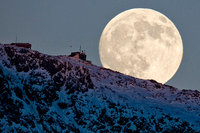The Moon to help man explore Mars

Opportunities for the Moon to become a "transit point" for further space exploration and a source of useful resources, including water, which it is very rich with, have been a topic for discussion for a long time. It is possible that Russia may become a pioneer in this field. Russian Federal Space Agency Roscosmos now seriously considers the possibility of building manned bases on the Earth's satellite.
The project is scheduled for 2030. The first step towards this goal will be the opening of the Center for Manned Space Flights.
The discovery of water on the Moon - about 600 million tons - interested many powers. Some are interested in using the water for its intended purpose, others - as fertile material. Russia, USA, China and India are among the interested sides.
The head of strategic planning and target programs of Roscosmos, Yuri Makarov, says: "The Moon is the most interesting object, if one makes the next step and builds a manned station there. Because we have everything (if water is found) to provide the station with products vital for life - rocket fuel, building materials - we have everything."
Roscosmos plans to conduct technical testing of the drilling system developed for ExoMars project during Russian lunar missions. Thus, in 2017, Russia plans to send the heavy Luna-Resource rover to the Moon. The rover will be outfitted with an expanded complex of scientific equipment.
ExoMars mission involves the launch of an orbiter in 2016 to study Mars and land a lander on its surface. In 2018, it is planned to launch a rover to the planet. Initially, the project was developed in cooperation between the European Space Agency and NASA, but the Americans pulled out from the project. The European Space Agency addressed Russia with an offer for cooperation.
Among the challenges that Roscosmos currently faces is the creation of an extra-heavy carrier rocket by 2028. The development of such systems is a hard nut to crack, taking into consideration the fact that a flight to Mars requires a space complex weighing from 500 to 1,000 tons. Today, a heavy rocket takes no more than 20-23 tons of cargo into space. There are other difficulties too, for example, the protection of the crew from solar and galactic radiation. The problems related to the lack of the magnetic field need to be solved too.
"After all, space travelers may experience unpredictable mutations, and we do not know yet how to struggle with them and what consequences the mutations may entail, especially in terms of procreation," admits Makarov.
Therefore, space exploration can only be conducted in stages. "Before we fly to Mars, man must learn to live and work on another celestial body, under conditions of different gravity and atmosphere. And it is the Moon that can become the unique system to obtain such education - the experience that we can get on the Moon will help us go further into space," said the head of Roscosmos.
To turn the moon into a "training ground," one needs to station satellite radars, necessary scientific equipment, optical systems - all that will be required to use it as an international space station. It will also create observatories that will be able to see a lot more than earth-based observatories can see. To crown it all, the Moon can be used as a platform for the studies that are impossible to conduct on board the ISS.
Roscosmos does not refuse from exploring the Red Planet either. The agency considers Mars as a strategic direction of space development, but at this stage, the Moon is a priority.
It is also possible to use the Earth satellite as a test ground for new technologies. One is only left to hope that the current political turmoil will not affect Russia's cooperation with the ESA. Ultimately, the new lunar program is a win-win program for all.
Prepared by Irina Shlionskaya
Pravda.Ru
Read the original in Russian
Subscribe to Pravda.Ru Telegram channel, Facebook, RSS!


